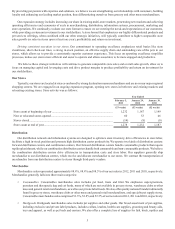Petsmart 2012 Annual Report Download - page 21
Download and view the complete annual report
Please find page 21 of the 2012 Petsmart annual report below. You can navigate through the pages in the report by either clicking on the pages listed below, or by using the keyword search tool below to find specific information within the annual report.13
A determination that we are in violation of any contractual obligations or government regulations could result in a disruption
to our operations and could impact our financial results.
We are subject to various contractual obligations with third-party providers and federal, state, provincial and local laws and
regulations governing, among other things: our relationships with employees, including minimum wage requirements, overtime,
terms and conditions of employment, working conditions and citizenship requirements; veterinary practices, or the operation of
veterinary hospitals in retail stores, that may impact our ability to operate veterinary hospitals in certain facilities; the transportation,
handling and sale of small pets; the generation, handling, storage, transportation and disposal of waste and biohazardous materials;
the distribution, import/export and sale of products; providing services to our customers; contracted services with various third-
party providers; environmental regulation; credit and debit card processing; the handling, security, protection and use of customer
and associate information; and the licensing and certification of services.
We seek to structure our operations to comply with all applicable federal, state, provincial and local laws and regulations of
each jurisdiction in which we operate. Given varying and uncertain interpretations of these laws and regulations and the fact that
the laws and regulations are enforced by the courts and by regulatory authorities with broad discretion, we can make no assurances
that we would be found to be in compliance in all jurisdictions. We also could be subject to costs, including fines, penalties or
sanctions and third-party claims as a result of violations of, or liabilities under, the above referenced contracts, laws and regulations.
Failure of our internal controls over financial reporting could harm our business and financial results.
We have documented and tested our internal controls over financial reporting to assess their design and operating effectiveness.
Internal controls over financial reporting have inherent limitations and are not intended to provide absolute assurance that a
misstatement of our financial statements would be prevented or detected. We may encounter problems or delays in completing
the review and evaluation, or implementing improvements. Additionally, we may identify deficiencies that need to be addressed
in our internal controls over financial reporting, or other matters that may raise concerns for investors. Should we, or our independent
registered public accounting firm, determine in future periods that we have a material weakness in our internal controls over
financial reporting, our results of operations or financial condition may be adversely affected and the price of our common stock
may decline.
Changes in laws, accounting standards and subjective assumptions, estimates and judgments by management related to complex
accounting matters could significantly affect our financial results.
Accounting principles generally accepted in the United States of America, or “GAAP,” and related accounting pronouncements,
implementation guidelines and interpretations with regard to a wide range of matters relevant to our business are highly complex,
continually evolving and involve many subjective assumptions, estimates and judgments by us. Changes in these rules or their
interpretation, or changes in facts, underlying assumptions, estimates or judgments could significantly impact our reported or
expected financial performance.
An unfavorable determination by tax regulators may cause our provision for income and other taxes to be inadequate and may
result in a material impact to our financial results.
We are subject to periodic audits and examinations by the Internal Revenue Service and other taxing authorities. Outcomes
from the tax audits or examinations that we may be subject to, or changes in the tax laws in any of the multiple jurisdictions in
which we operate, could result in an unfavorable change in our effective tax rate which could have an adverse effect on our business
and financial results.
Failure to obtain commercial insurance at acceptable prices or failure to adequately reserve for self-insured exposures might
have a negative impact on our business.
We procure insurance to help us manage a variety of risks. A failure of insurance to provide coverage for these risks may
expose us to expensive defense costs and the costs of the ultimate outcome of the matter. Insurance costs continue to be volatile,
affected by natural catastrophes, fear of terrorism, financial irregularities and fraud at other publicly traded companies and fiscal
viability of insurers. We believe that commercial insurance coverage is prudent for risk management, and insurance costs may
increase substantially in the future. In addition, for certain types or levels of risk, such as risks associated with earthquakes,
hurricanes or terrorist attacks, we may determine that we cannot obtain commercial insurance at acceptable prices. Therefore, we
may choose to forego or limit our purchase of relevant commercial insurance, choosing instead to self-insure one or more types
or levels of risks. Provisions for losses related to self-insured risks are based upon independent actuarially determined estimates.
We maintain stop-loss coverage to limit the exposure related to certain risks. The assumptions underlying the ultimate costs of
existing claim losses are subject to a high degree of unpredictability, which can affect the liability recorded for such claims. For
example, variability in inflation rates of health care costs inherent in these claims can affect the amounts realized. Similarly,
changes in legal trends and interpretations, as well as a change in the nature and method of how claims are settled can impact
























